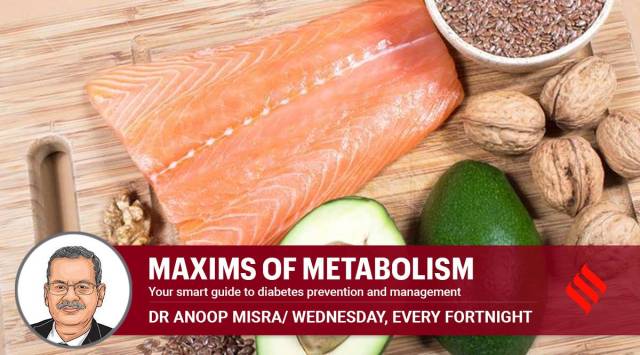- India
- International
Omega-3 fish oil supplements: Can they reduce triglycerides, risk of heart disease and improve metabolism?
A recent trial shows why Omega-3 fatty acid provides hope for further protection of the heart in people suffering from heart ailments and who have been treated with statins, says Dr Anoop Misra, Chairman, Fortis CDOC Hospital for Diabetes and Allied Sciences
 Omega 3 fatty acids can decrease the tendency for clotting, and even prevent heart-related death. (Pic source: Getty/Thinkstock)
Omega 3 fatty acids can decrease the tendency for clotting, and even prevent heart-related death. (Pic source: Getty/Thinkstock) Often my vegetarian patients ask me how they can get their desired quota of Omega-3 fatty acids considering they are found abundantly in fish. Omega-3 polyunsaturated fatty acids (also called “fish oils”, primarily eicosapentaenoic acid, EPA, and docosahexaenoic acid, DHA) are dietary fats with beneficial properties for health. The human body does not produce these Omega-3 fatty acids and their pure form is obtained from sea fish (for example, liver of lean white fish such as cod and halibut, the body of oily fish such as mackerel, menhaden and salmon, and the fat of marine mammals such as seals and whales). Vegetarian sources are few (explained later).
WHY ARE OMEGA-3 FATTY ACIDS IMPORTANT FOR METABOLISM?
To understand this, one must take a look at studies done in extremely cold geographical locations such as Greenland. Interestingly, the “Eskimo paradox” is seen here, which means that despite eating dietary fat and cholesterol in a very high amount, (40 per cent of their caloric intake), indigenous people in Greenland (called the Inuit) showed a low incidence of cardiovascular diseases. These fatty acids are important for regulation of blood triglyceride levels, maintaining integrity of the outer wall of cells and in helping complex signals inside the cells. In addition, these are important for increasing plasticity of walls of arteries, and to suppress inflammation.
Once we talk of Omega-3 fatty acids, heart health comes foremost in our minds. These fatty acids can decrease the tendency for clotting, and even prevent heart-related death. While shown in many studies, their beneficial effects on heart and arteries continue to be discussed. Other uses, some of which are not backed up by conclusive data, include those in various illnesses; joint inflammation (arthritis), brain decline (cognitive slowness, depression), cancers (e.g., prostate), irregularities of heart (atrial fibrillation) and diabetes. One benefit which has recurrently been a topic of research is the good effects of Omega-3 fatty acids in development of the eye and brain of the foetus.
The benefit of Omega-3 fatty acid on blood triglyceride levels has been proven without doubt. According to the American Heart Association, consuming 2 to 4 grams (considered as high dose, to be taken under medical supervision) of Omega-3 fatty acids per day can lower triglycerides by 20 to 40 per cent. In medical practice, we use such doses in some patients with uncontrolled triglyceride levels (seen in Indians) despite application of optimum diet, exercise and other drugs.
Recently an important trial (The REDUCE-IT trial) tested the efficacy of a type of Omega-3 fatty acids (icosapent ethyl ester of the Omega-3 fatty acid eicosapentaenoic acid) in people who had heart disease, were on powerful cholesterol-lowering drugs or statins but still had high triglyceride levels. In this trial, icosapent ethyl ester reduced triglyceride levels and most importantly, reduced the risk of heart attack and stroke by 25 per cent and the risk of heart attack related death by 20 per cent. This type of Omega-3 fatty acid provides hope for further protection of the heart in people suffering from heart ailments and who are treated with statins.
WHAT ARE OPTIONS FOR VEGETARIANS?

Vegetarian sources of fatty acids, termed as alpha linolenic acid, must be converted in the human body to (long chain) Omega-3 fatty acids (same pure form as found in fish), but this conversion is poorly achieved. Hence vegetarians may have low levels of blood Omega-3 fatty acids. These plant food items contain alpha linolenic acid (listed here from highest to lowest contents): Flaxseed oil and flaxseeds, chia seeds, walnut or walnut oil, canola, soyabean and mustard oils, pistachio nuts, pumpkin seeds, and almonds. Other food items, purslane (a green leafy vegetable, Kulpha) and Brussels sprouts also contain Omega-3 fatty acids.
Interestingly, genetic modification of some plants (such as flax and Brassica) has led to manufacturing of oils which contain Omega-3 fatty acids without a fish odour. People often take cod liver oil (extracted from livers of cod, haddock, halibut, shark, whales, and tuna) thinking that it is a good source of Omega-3 fatty acids. While it may not contain as much Omega-3 fatty acids as the other marine sources listed above, it is a more important source of vitamin A and vitamin D, which can be harmful in excessive amounts.
ARE SUPPLEMENTS SAFE ENOUGH?
Omega-3 fatty acids, taken as supplements (fish oil capsules containing EPA and DHA) are generally safe and well tolerated, but they may cause some adverse effects in some people, depending upon dose and duration of use. One must consider that these drugs could cause bleeding, especially if a person is on blood thinner medications. In a few people, these could cause stomach upset. These should be taken under medical supervision.
So, what do I tell my patients? Non-vegetarians should eat fish twice a week (this provides 500 milligrams of EPA and DHA/day), and vegetarians should incorporate oils, nuts and seeds mentioned here. Capsules of fish oils will be needed in a few people having high blood triglycerides levels. Without doubt, with enhanced blood levels of Omega-3 fatty acids, both triglycerides and metabolic health can be taken care of.
(Dr Misra is Padma Shree awardee and author of “Diabetes with Delight”)
Must Read
Apr 27: Latest News
- 01
- 02
- 03
- 04
- 05








































